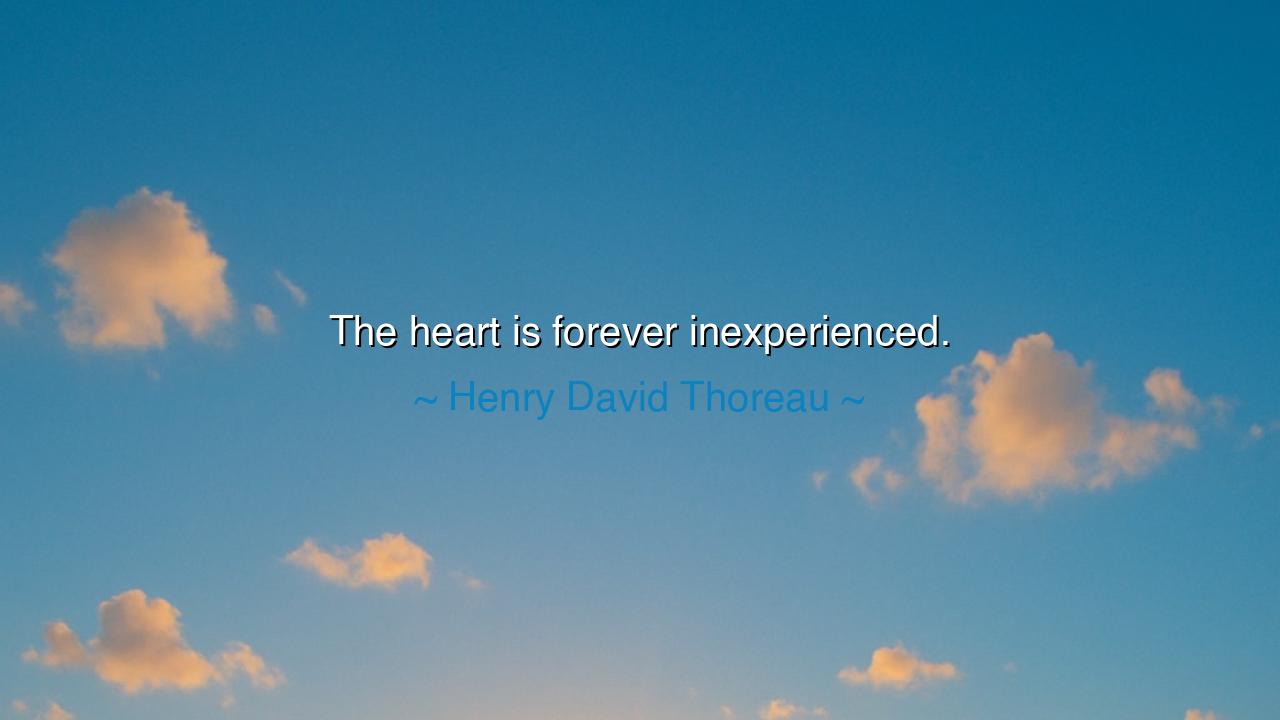
The heart is forever inexperienced.






Henry David Thoreau, the hermit of Walden and seeker of eternal truths, once declared: “The heart is forever inexperienced.” In this brief yet profound saying, he unveils the mystery of love and feeling—that no matter how often the heart has known joy or sorrow, it greets each new encounter as though for the first time. Unlike the mind, which gathers knowledge and stores it as memory, the heart does not age in wisdom. It trembles anew with every hope, and it breaks anew with every loss.
The ancients knew this paradox well. They told of heroes who could conquer nations but fell helpless before the glance of a maiden, of sages who mastered reason yet remained fools in love. The heart, unlike the intellect, cannot be trained by repetition. Each passion, each grief, each union awakens a fresh vulnerability, reminding us that to feel deeply is always to risk being undone.
Thoreau’s words also carry the weight of humility. To say that the heart is forever inexperienced is to confess that we never truly master it. No matter how seasoned in life, no man or woman can claim mastery over their own emotions. Every new affection shocks us with its intensity; every new sorrow cuts as though it were the first wound ever felt. The heart refuses to grow calloused, for its strength lies not in protection, but in its willingness to remain open.
This teaching is both a warning and a blessing. A warning, because it tells us that we will never escape the vulnerability of love; we will always be exposed to its power, whether it brings ecstasy or despair. A blessing, because it assures us that wonder never fades—that we are always capable of fresh joy, of feeling young again, even in old age, for the heart does not grow weary of loving.
Let the generations remember: the heart is not a scholar but an eternal child. It knows nothing of calculation, and it learns nothing from caution. Its very innocence is what keeps life sacred. Thus Thoreau teaches us that to live fully is to embrace this endless inexperience, to accept that every beat of the heart is both new and ancient, fragile and immortal, foolish and divine.






TAnguyen thi tam an
Thoreau's words remind me of the idea that the heart, in its essence, is pure and unchanging, despite all the complexities we face. Is that possible, though? Can the heart remain ‘inexperienced’ in a world full of hardship and pain? Or does the heart, in its attempts to experience, only grow deeper in its understanding? It’s a bit of a paradox, don’t you think? How do you read this quote in light of your own emotional journey?
DKQuoc Huynh Dang Kien
I’ve always thought about the heart as a place of deep emotions, but this quote challenges that notion. What if the heart never fully understands or adapts, even after years of experiences? Is there wisdom in this innocence, or does it mean we're constantly vulnerable? I’m curious about the idea of perpetual innocence. Could this be seen as the heart’s greatest strength or its biggest flaw? How do you interpret it?
TTThanh thao Tran
This quote feels like a reminder that the heart is constantly open to new experiences and emotions. I wonder, though, if this openness is always a good thing? Sometimes, after heartbreak or loss, it might seem like the heart should learn to close itself off. But if the heart is always inexperienced, maybe it's also always capable of hope and renewal. What do you think, is it a blessing or a curse?
PDDao Phi Dung
I find this quote to be quite profound. It suggests that no matter how many experiences we go through, the heart remains untainted and innocent. Does that mean that, even after all the emotional lessons, we never really ‘learn’ to protect ourselves? I wonder if Thoreau is implying that the heart will always seek out new connections, no matter the past hurt. What do you think? Does that resonate with your own experiences?